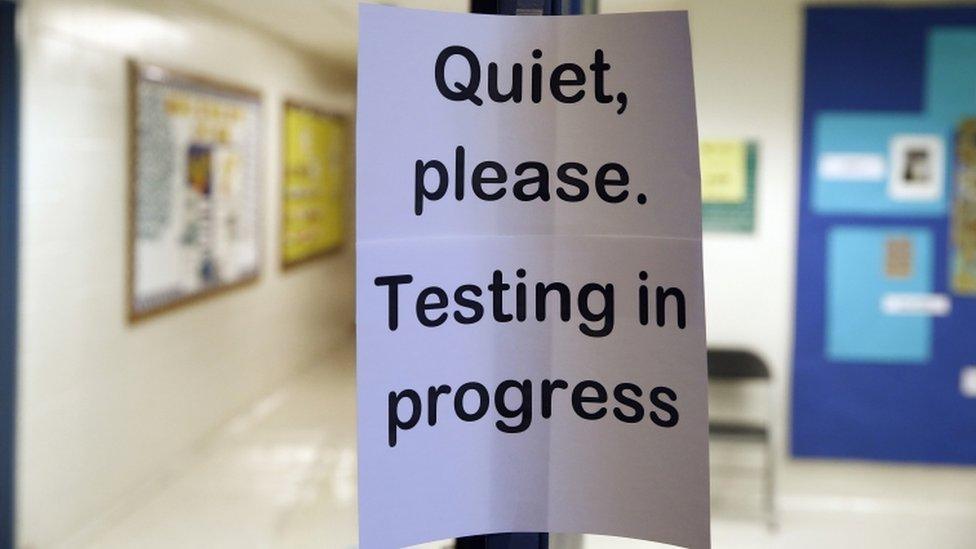SQA 'urgently needs to build trust'
- Published

Teachers have complained about poor guidance from the SQA, and errors in exam papers
Urgent work is needed to rebuild the relationship between Scotland's teachers and the country's exam body, according to MSPs.
Holyrood's education committee said it had heard "eye-opening" accounts of unclear guidance and mistakes in exam papers.
A survey of teachers carried out by the committee suggested two-thirds had little trust in the SQA.
Its report made a series of recommendations for improvement.
Much of the criticism of the Scottish Qualification Authority (SQA) stems from perceived problems around the introduction of new exams, including National 4 and 5 and the new Higher.
'Onerous workload'
It has included concerns over last year's Higher geography exam, which was described as "poor, shocking, terrible, worst ever and nothing like the specimen or previous paper" by members of the Scottish Association of Geography Teachers.
The SQA also admitted a series of mistakes in the national 5 computing science exam.
And in 2015, the pass mark for Higher maths was dropped to just 34%, and to 60% for an A grade, with the SQA admitting the exam had been too hard.
The education committee's report said the SQA had produced qualifications that had led to an "onerous workload, a breakdown in trust and threats of industrial action by teachers".
It said it had received clear evidence pointing to a breakdown in the trust of the SQA by teachers.
Communication with teachers
And it raised concerns about exam scripts that either contained errors or were difficult to understand.
Among its key recommendations were:
Improvements should be made in the design, delivery, supporting documents and marking of national qualifications and the SQA's communication with teachers.
Efforts should be focused on ensuring that there are no errors in either the production or marking of exams.
Data collection from chief invigilators should be improved to ensure that the living wage is paid to all the people it appoints.
The report followed scrutiny of four key public bodies charged with developing and implementing education and skills policy - the SQA, the Scottish Funding Council (SFC), Skills Development Scotland (SDS) and Education Scotland.
It also raised concern about the recommended abolition of the SFC as part of moves to put all of the Scottish government's economic agencies under a single national board.
The report questioned the evidence for the change, and called on the Scottish government to carefully consider the impact abolishing the SFC board will have on higher education, including on widening access, before proceeding.

The SQA admitted that the Higher maths exam in 2015 was too hard, and lowered the pass mark to 34%
SNP MSP James Dornan, the committee's convenor, said: "The evidence our committee received was nothing less than eye-opening about some of the problems faced by those working so hard on the front line of education.
"We heard first-hand about the time-consuming burden of guidance that has been placed on teachers, something the cabinet secretary has already shown his commitment to deal with.
"However, there continues to be confusing and contradictory messages coming from the very bodies that should be making it easy for our teachers to focus on the needs of our children."
Mr Dornan said the committee had told the organisations concerned "in no uncertain terms" how their actions impact on teachers.
He added: "The committee found it hard to understand how, in particular, the SQA has met the needs of Scotland's learners having designed qualifications that have created a huge workload for teachers and led to a breakdown in trust and threats of industrial action."
'Period of change'
The SQA thanked the committee for its recommendations, which it said would now be studied in detail.
A spokesman said: "Our relationship with teachers is critically important to the successful delivery of Scotland's qualifications system and every year 15,000 teachers work with us as appointees.
"We are committed to addressing the committee's findings, especially in this period of change, and are working to continue to improve our communication with the wider community.
"We are already streamlining the documentation associated with the qualifications as new arrangements are rolled out.
"We are keenly aware of our responsibility to establish and maintain the standard and quality of qualifications for the benefit of learners across Scotland."